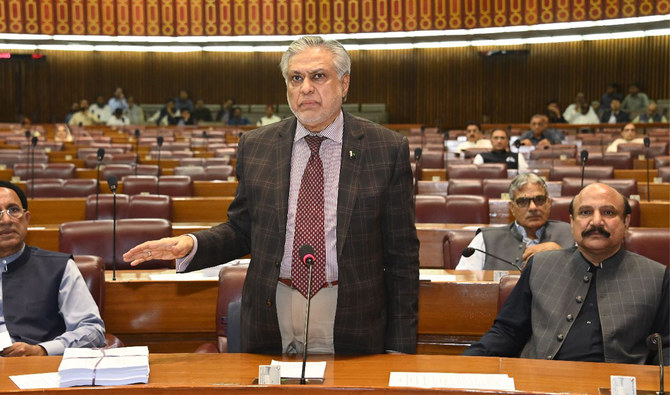ISLAMABAD: The National Assembly, the lower house of Pakistan parliament, on Sunday approved Federal Budget 2023-24, a day after Prime Minister Shehbaz Sharif’s government added several fiscal tightening measures to it in order to meet the International Monetary Fund (IMF) requirements.
For the fiscal year starting next month, Pakistan will raise a further 215 billion rupees ($752 million) in new tax and cut 85 billion rupees in spending as well as a number of other measures to shrink the fiscal deficit, according to Finance Minister Ishaq Dar. The measures will revise Pakistan’s revenue collection target to 9.415 trillion rupees ($33 billion) and put total spending at 14.480 trillion rupees ($51 billion).
Pakistan made the last-ditch effort to secure a $1.1 billion loan tranche from the IMF before its Extended Fund Facility agreed in 2019 expires on June 30. The $6.5 billion program has been stalled since November. With the central bank's foreign exchange reserves barely enough to cover a month of imports, Pakistan is facing an acute balance-of-payment crisis, which analysts say may spiral into a debt default if the IMF funds do not come through.
The budget was passed during a session that included only 70 lawmakers from the treasury, with Dar defending the government’s move to implement various reforms in the pensions scheme.
“If someone has a job on a contract then he will have to choose between the two pensions. This should have been corrected a long time ago,” the finance minister said.
“It is a matter of principle... Our pension bill went to Rs800bn in this budget. It is a huge amount.”
When a pensioner died, their widowed spouse would receive the stipend, but if the spouse died too, their dependents would get pension for only 10 years, according to Dar.
The finance minister said the reforms were the need of the hour.
On Saturday, PM Sharif also held a meeting with IMF Managing Director Kristalina Georgieva in Paris, at which he reiterated Pakistan’s commitment to complete the $6.5 billion loan program.
The prime minister agreed that “inevitable measures” would have to be taken to overcome the economic crisis that has engulfed Pakistan over the last four years, Pakistani state media reported.
Pakistan has changed its budget for the financial year starting on July 1 to clinch the stalled IMF bailout. The IMF funding is critical to unlock other bilateral and multilateral financing for the debt-ridden South Asian economy.















